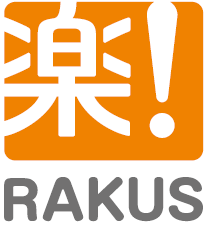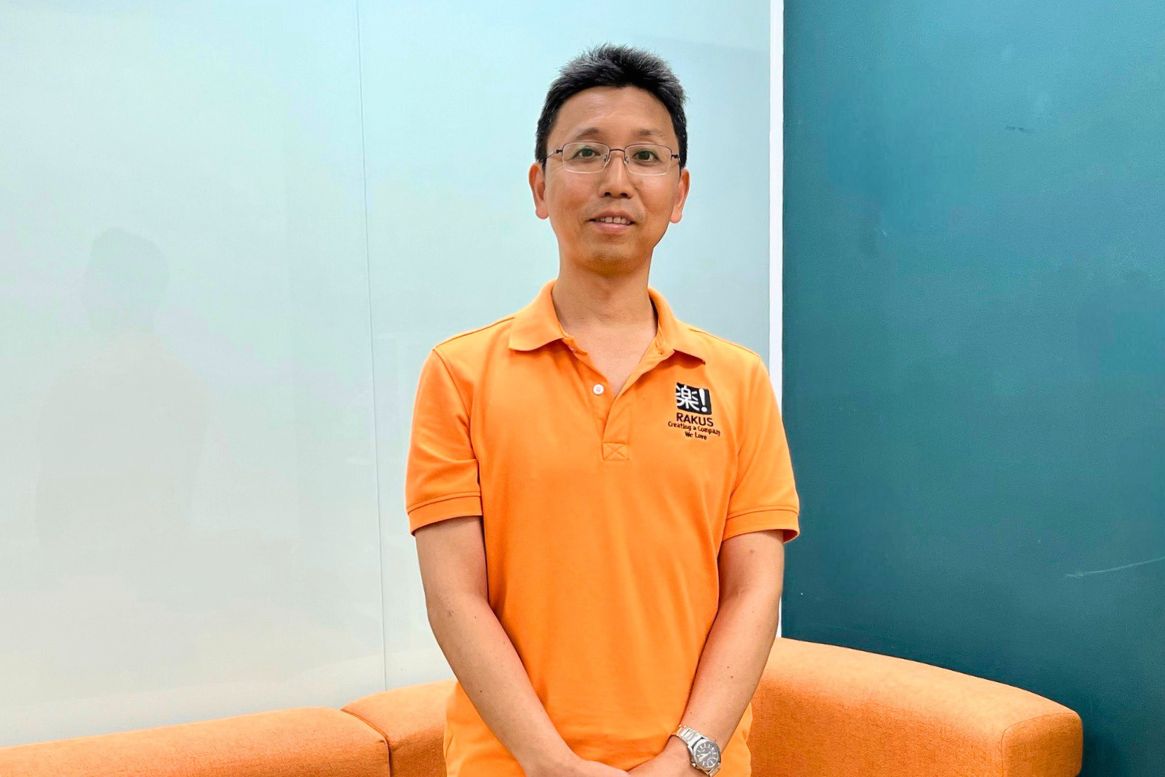PROFILE:
- NAME: Takashi Ogawa
- POSITION: Rakus Vietnam CO., LTD – Branch Manager.
—– Could you tell us about your background, Mr. Ogawa?
I worked at my previous job for 25 years and have been with Rakus for two years since my first job change. My previous company was in the IT sector, where I was in charge of outsourcing offshore development to a subsidiary in Vietnam for 10 years. My collaboration with Vietnamese employees inspired me to move to Vietnam, and I transferred to our Vietnamese subsidiary. I have been working mainly in development management in Vietnam for 15 years.
—– How do you spend your off time?
I spend a lot of time with my family. My wife is Vietnamese, and we have a middle schooler and a primary schooler. The kids go to an international school, but I worry they might not be able to speak Japanese when they grow up, so they attend a Japanese supplementary school on Saturdays. I spend Saturdays driving them and helping with their homework on weekday evenings. On Sundays, we relax with my wife’s family – her parents, sisters, and their families – or go out with our children’s friends’ families. Vietnamese parents are very enthusiastic about education, and I take their advice on my children’s education and guidance.
—– Can you tell us about your role and responsibilities at Rakus Vietnam?
Rakus Vietnam has two bases in Ho Chi Minh City, known as RV1 and RV2. I am in charge of the RV1 base. My mission involves expanding the RV1 organization and enhancing its development capabilities. My work involves general organizational operations, including hiring, HR, development management, and communication with Rakus headquarters, among various tasks.
—– What services and areas do RV1 and RV2 handle?
RV1 is responsible for parts of the development of “RakuRaku Seisan,” “RakuRaku Meisai,” “Rakuraku Hanbai,” and “HaiHai Mail,” while RV2 handles parts of “RakuRaku Meisai” and “Mail Dealer.” Essentially, they are involved in almost all of Rakus’ main services. Although there are differences between each service, RV is responsible for about 30% to 40% of the development workload.
—– Could you explain why the RV development team is expanding?
Rakus’ services are continuously growing, and we want to further enhance our development capabilities for service expansion. Previously, RV members mainly handled implementation, but as their skills have improved, they’ve expanded into design and testing. Rakus headquarters has high expectations for development capabilities in Vietnam, and RV is expanding in response.
—– How do you collaborate with Japan in development?
In Japan, development requirements are compiled and transmitted to RV, where we handle design, implementation, and testing. Communication is conducted in Japanese through documents and meetings, with RV’s interpreters and translators converting everything into Vietnamese for RV members. We also have Vietnamese bridge SEs in Japan to follow up on progress and clarify any confusing requirements directly with RV members, ensuring as little misunderstanding as possible.
—– What do you focus on when collaborating between Japan and RV?
Both Japan and RV emphasize knowing and respecting each member. For example, members from Japan and Vietnam regularly travel to each other’s locations, work together, and communicate through one-on-ones and social gatherings. When Japanese members visit Vietnam, they actively participate in RV events like employee trips and annual parties, which significantly enhances closeness.
We also practice mutual appreciation for tasks well done to encourage positive behavior. Mistakes are not berated but seen as opportunities for improvement. It’s about hating the sin, but not the sinner, so to speak.
—– What is your impression of the development team you work with?
RV members are cooperative, improvement-driven, skill-hungry, and eager to meet the expectations of the Japanese side. We focus on these qualities in hiring. They earnestly listen to my suggestions for improvement and actively share their perspectives, which I might have missed. It’s very gratifying and makes my job easier.
They’re also good at switching between work and leisure. On Tuesdays and Thursdays, they plan their work so they can finish on time to participate in the company’s badminton and soccer circles.
There’s a strong sense of camaraderie among the employees, and they’re very close, even on a family level. Everyone warmly welcomes new employees, including those from Japan.
—– What are the challenges you want to tackle in the future?
So far, RV has mainly implemented technological solutions provided by the Japanese side. As RV grows, we expect to engage in global development in unison with Japan. Specifically, we want RV to independently solve problems, including technological solutions, and ensure quality in expanded design and testing processes without the need for the Japanese side’s review or retesting.
My strength is in management, so I’d be happy to welcome technically skilled individuals to join
and collaborate with me and the Japanese side to further enhance the technical and quality assurance capabilities of RV members.
With plans to expand current services and develop new ones, the presence of technically skilled people at RV will become increasingly significant.
—– What kind of development organization do you want to grow into?
I want to create a technically and qualitatively independent development organization that can operate without relying on the Japanese side. Our current organization still lacks mechanisms and operations to ensure technology and quality. I want to develop these mechanisms with both RV and Japanese members, set concrete numerical goals, and achieve them through a continuous PDCA cycle.
—– What do you value in your work?
I find fulfillment in contributing to and pleasing all parties involved. Therefore, I focus on achieving win-win outcomes in my work.
RV members, as mentioned, are growth-oriented. Collaborating with RV’s PMs and Japan, I strive to create an environment where each member can try one step ahead in their desired direction. It’s gratifying for the members and beneficial for both RV and Japan.
Communication is also vital. Both Japan and Vietnam are high-context cultures. Sometimes, indirect expressions in meetings can lead to misunderstandings. When I sense this, I rephrase it more directly to prevent gaps. These small gaps can accumulate into significant organizational problems, so I address them promptly.
—– What is rewarding about working at Rakus Vietnam?
The rewarding part is growing alongside the young and dynamic RV members, backed by the full support of Rakus’s development team. We are not limited to a single service but are involved in multiple main services, giving a tangible sense of contribution to Rakus. It’s also gratifying when I temporarily return to Japan for business trips and am warmly welcomed by the development team at Rakus headquarters.
—– Please give us a message for those interested in RV?
Vietnam is a great country to live in, with the cost of daily necessities being about 30% of Japan’s. It’s safe, has a warm climate, and is full of youthful energy. There are plenty of Japanese goods and Japanese cuisine available, making it a comfortable country for Japanese people to live in, even for those without overseas experience. I would be delighted if those interested in RV apply. Also, for those already living in Vietnam and wanting to grow deeper relationships with Vietnamese members, I encourage you to apply.

